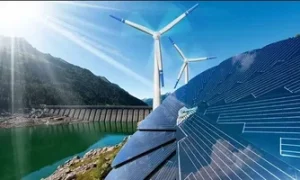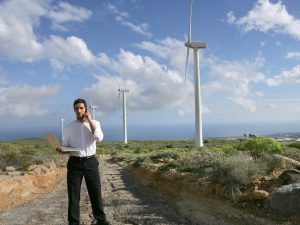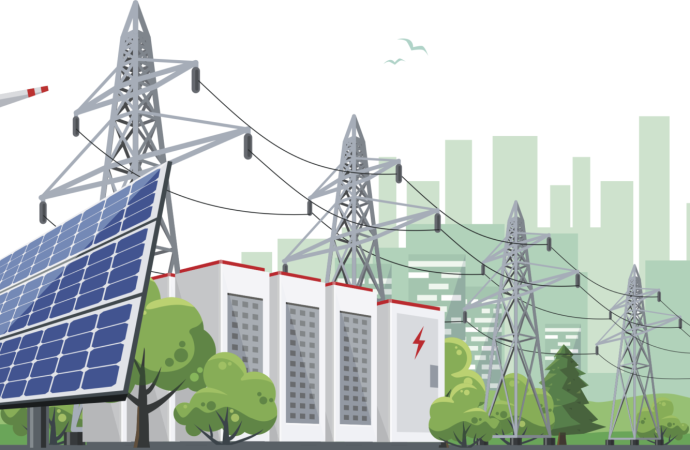Current Status of Renewable Energy in Spain Progress towards 100% renewable energy goal in Spain: Spain has made significant progress towards its goal of achieving 100% renewable energy. Currently, renewable sources account for 60% of the country’s electricity generation, with wind and solar power leading the way. This progress is a result of strategic government
Current Status of Renewable Energy in Spain
Progress towards 100% renewable energy goal in Spain:
Spain has made significant progress towards its goal of achieving 100% renewable energy. Currently, renewable sources account for 60% of the country’s electricity generation, with wind and solar power leading the way. This progress is a result of strategic government policies and incentives that have encouraged investment in renewable energy projects.
Challenges in reaching 100% renewable energy target in Spain:

Image by : Yandex
Despite the progress made, Spain still faces challenges in reaching its 100% renewable energy target. One of the main challenges is the intermittency of solar and wind energy sources, which can lead to fluctuations in electricity generation. Another challenge is grid integration, as high penetration of renewable energy can strain the existing infrastructure. However, with continued investment and technological advancements, these challenges can be overcome.
Government Policies and Incentives
Government policies support Spain’s renewable energy growth:
The Spanish government has implemented various policies to support the growth of renewable energy in the country. These include feed-in tariffs, auctions for renewable energy projects, and tax incentives for renewable energy investments. These policies have created a favorable environment for renewable energy development and have attracted both domestic and foreign investors.
Incentives drive Spain’s renewable energy sector expansion:
In addition to government policies, incentives play a crucial role in driving Spain’s renewable energy sector expansion. These incentives include subsidies for renewable energy projects, grants for research and development in renewable technologies, and tax breaks for companies investing in renewable energy. These incentives have helped to increase the competitiveness of renewable energy sources and have accelerated the transition towards a more sustainable energy system.
Major Renewable Energy Projects
Spain leading in renewable energy production:
Spain is a leader in renewable energy production, with a strong focus on wind and solar power. The country has invested heavily in renewable energy projects, with major developments in both onshore and offshore wind farms, as well as large-scale solar installations. These projects have not only increased the country’s renewable energy capacity but have also created jobs and stimulated economic growth.
Investment in major renewable energy projects increasing:
The investment in major renewable energy projects in Spain is on the rise, with both public and private sector funding contributing to the development of new renewable energy infrastructure. This investment is crucial for meeting the country’s renewable energy goals and for reducing greenhouse gas emissions. With continued support and funding, Spain is well-positioned to further expand its renewable energy capacity.
Impact on the Economy
Increase in job opportunities in the renewable sector:
The growth of the renewable energy sector in Spain has led to an increase in job opportunities, particularly in the areas of construction, engineering, and maintenance of renewable energy projects. This has helped to boost the economy and create new employment opportunities for local communities. As the renewable energy sector continues to expand, more jobs are expected to be created, further stimulating economic growth.
Decrease in greenhouse gas emissions:

Image by : Yandex
One of the key benefits of Spain’s transition to renewable energy is the significant reduction in greenhouse gas emissions. By replacing fossil fuel-based power generation with clean and renewable sources, Spain has been able to reduce its carbon footprint and contribute to global efforts to combat climate change. This shift towards a more sustainable energy system is not only beneficial for the environment but also for the economy, as it reduces the country’s dependence on imported fossil fuels.
Technological Innovations
Technological advancements driving Spain’s Renewable Energy growth:
Technological innovations play a crucial role in driving Spain’s renewable energy growth. Advances in solar panel efficiency, wind turbine design, and energy storage technologies have made renewable energy sources more reliable and cost-effective. These innovations have helped to overcome some of the challenges associated with renewable energy, such as intermittency and grid integration, and have paved the way for further expansion of renewable energy capacity.
Innovations improving efficiency and sustainability of Spain’s Renewable Energy:
In addition to driving growth, technological innovations have also improved the efficiency and sustainability of Spain’s renewable energy sector. For example, smart grid technologies enable better integration of renewable energy sources into the grid, while energy storage solutions help to store excess energy for times of high demand. These innovations not only make renewable energy more reliable but also help to reduce costs and environmental impact, making them a key driver of Spain’s renewable energy transition.
Challenges and Obstacles
Intermittency of solar and wind energy sources:
One of the main challenges facing Spain’s renewable energy sector is the intermittency of solar and wind energy sources. As these sources depend on weather conditions, there can be fluctuations in electricity generation, which can pose challenges for grid stability and reliability. To address this issue, Spain is investing in energy storage technologies and grid infrastructure upgrades to better integrate renewable energy into the power system.
Grid integration challenges with high renewable penetration:
Another challenge is grid integration, especially as Spain aims to increase its renewable energy penetration to 100%. High levels of renewable energy can strain the existing grid infrastructure, leading to issues such as grid congestion and voltage fluctuations. To overcome these challenges, Spain is implementing smart grid technologies, demand response programs, and flexible power plants to ensure a smooth transition to a more renewable energy-based system.
Future Projections

Image by : Yandex
Spain’s Renewable Energy goals for the next decade:
Looking ahead, Spain has ambitious goals for its renewable energy sector in the next decade. The country aims to further increase its renewable energy capacity, with a focus on expanding solar and wind power generation. By 2030, Spain plans to reach 70% renewable energy in its electricity mix, moving closer to its ultimate goal of 100% renewable energy. To achieve these targets, Spain will need to continue investing in renewable energy projects, implementing supportive policies, and fostering technological innovations.
Challenges in achieving 100% renewable energy in Spain:
While Spain has made significant progress in its renewable energy transition, there are still challenges to overcome in achieving 100% renewable energy. These challenges include the need for further grid upgrades, energy storage solutions, and regulatory reforms to support the integration of renewable energy sources. Additionally, Spain will need to address issues such as land use conflicts, permitting processes, and public acceptance of renewable energy projects to ensure a smooth transition to a more sustainable energy system.
Role of Private Sector
Private sector investment crucial for Spain’s Renewable Energy growth:
The private sector plays a crucial role in driving Spain’s renewable energy growth, with companies investing in renewable energy projects, technologies, and infrastructure. Private sector investment helps to accelerate the development of renewable energy projects, create jobs, and stimulate economic growth. By partnering with the private sector, Spain can leverage their expertise, resources, and innovation to further expand its renewable energy capacity and achieve its sustainability goals.
Partnerships with private sector can accelerate renewable energy projects:
Partnerships between the public and private sectors can accelerate the development of renewable energy projects in Spain. By working together, governments and companies can leverage their respective strengths to overcome challenges, share risks, and drive innovation in the renewable energy sector. Public-private partnerships can also help to attract investment, access new technologies, and foster collaboration between different stakeholders. By fostering strong partnerships, Spain can create a more robust and sustainable renewable energy ecosystem for the future.
















